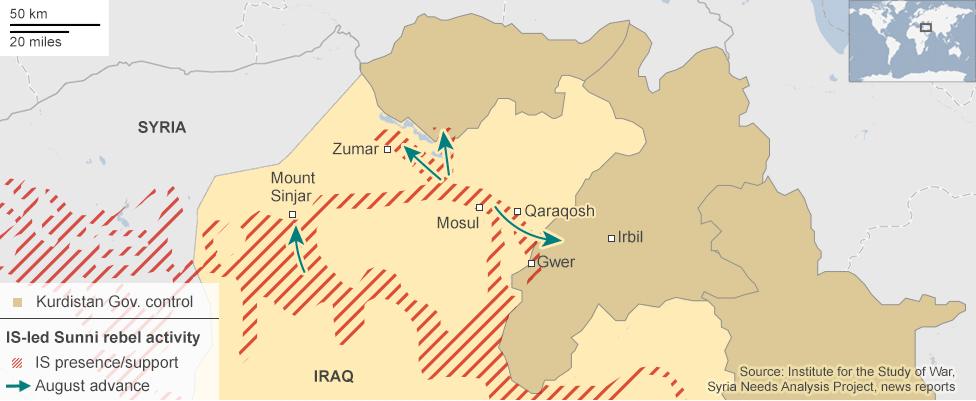James Foley: Islamic State militants 'behead reporter'
- Published
James Foley had worked extensively across the Middle East and understood the dangers, as Ian Pannell reports
The Islamic State (IS) has released a video online purporting to show the beheading of US journalist James Foley, who went missing in Syria in 2012.
The jihadist militant group said the killing was revenge for US air strikes against its fighters in Iraq.
Foley's mother Diane said on Facebook, external she was proud of her son: "He gave his life trying to expose the world to the suffering of the Syrian people."
The White House said if the video was genuine, the US would be "appalled".
Foley, 40, has reported extensively across the Middle East, working for the US publication GlobalPost and other media outlets including French news agency AFP.
British accent
In the video, titled A Message to America, a man identified as James Foley is dressed in an orange jumpsuit, kneeling in desert-like terrain beside an armed man dressed in black.
He gives a message to his family and links his imminent death to the US government's bombing campaign of IS targets in Iraq.
Clearly under duress, he says: "I call on my friends, family and loved ones to rise up against my real killers, the US government, for what will happen to me is only a result of their complacency and criminality."
Then the masked militant, who speaks with a British accent, delivers a warning to the US government: "You are no longer fighting an insurgency. We are an Islamic Army and a state that has been accepted by a large number of Muslims worldwide.
The killer speaks with a British accent, as the BBC's Frank Gardner reports. Some listeners may find parts of this audio disturbing.
"So any attempt by you Obama to deny the Muslims their rights of living in safety under the Islamic caliphate will result in the bloodshed of your people."
After he speaks, the militant appears to start cutting at his captive's neck before the video fades to black.
His body is then seen on the ground.
Another captive, identified as American journalist Steven Sotloff, is shown at the end, with the warning that his fate depends on President Barack Obama's next move.
Mr Sotloff was abducted a year ago in northern Syria, close to the border with Turkey.
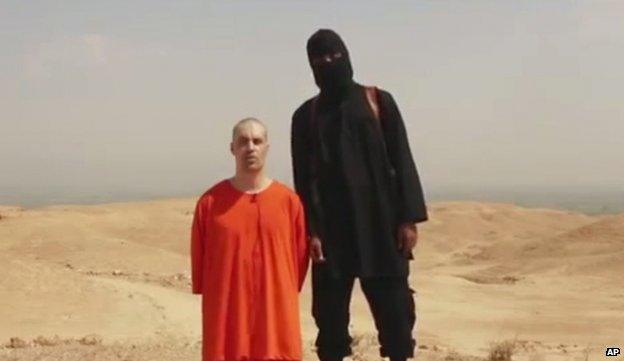
In the undated video of James Foley, the masked militant accuses the US of attacking IS daily in Iraq
In a statement, GlobalPost asked for "prayers for Jim and his family", adding that it was waiting for the video to be verified.
UK Prime Minister David Cameron said, external "if true, the murder of James Foley is shocking and depraved."
Foreign Secretary Philip Hammond acknowledged the militant appeared to be British. The involvement of a significant number of UK nationals in Syria and Iraq was "one of the reasons why this organisation represents such a direct threat to the UK's national security", he told the BBC.
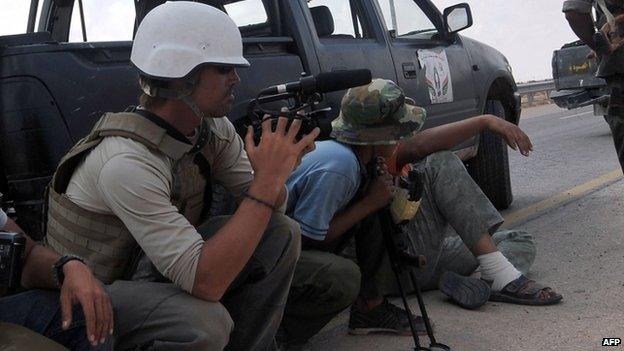
James Foley has been missing since he was seized in Syria in 2012
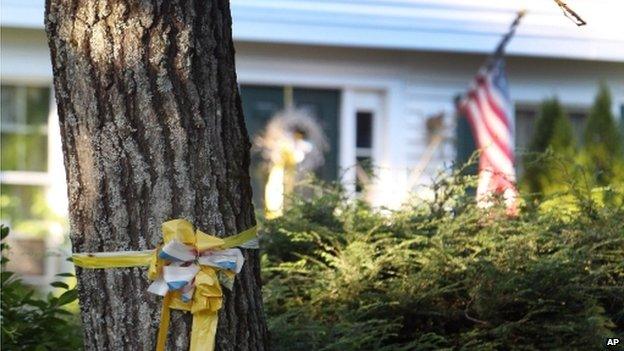
A ribbon is tied to a tree outside James Foley's house in Rochester, New Hampshire
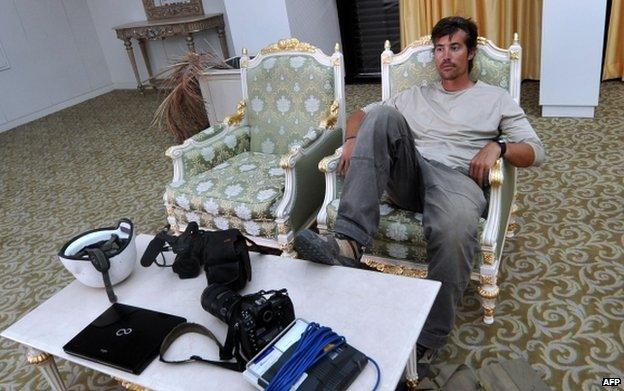
James Foley had previously reported from Libya in 2011, where he was held for six weeks
Foley had covered the war in Libya and was detained there for more than 40 days.
"I'm drawn to the drama of the conflict and trying to expose untold stories," he told the BBC in 2012.
In 2012 James Foley told the BBC about the importance of freelance journalists in the frontline at an event to raise money for a colleague who was killed in Libya
"There's extreme violence, but there's a will to find who these people really are. And I think that's what's really inspiring about it."
US officials confirmed that they had seen the video. One said it appeared to be authentic while two others said the victim was Foley, Associated Press reports.
President Obama is expected to make a statement later. White House National Security Council spokeswoman Caitlin Hayden said: "If genuine, we are appalled by the brutal murder of an innocent American journalist and we express our deepest condolences to his family and friends."
Mrs Foley, in her Facebook post, urged the militants to free any other hostages.
"Like Jim, they are innocents. They have no control over American government policy in Iraq, Syria or anywhere in the world," she wrote.
The US-based Committee to Protect Journalists estimates that 20 journalists are missing in Syria, local as well as international, and believes many are held by IS militants.
The US launched air strikes almost a fortnight ago, in an attempt to help Kurdish forces curb the advance of Islamic State militants in northern Iraq and recapture the Mosul dam, the biggest in Iraq.
President Obama described IS militants on Monday as "a threat to all Iraqis and to the entire region". He said the Iraqi people needed to reject them and unite to begin to push them out of the lands they had occupied.
IS has been accused of massacring hundreds of people in areas under its control in Iraq and also in eastern Syria.

Formed out of al-Qaeda in Iraq (AQI) in 2013, IS captured Raqqa in eastern Syria
By early 2014 it controlled Fallujah in western Iraq
It has since captured broad swathes of Iraq, seizing Mosul in the north in June and the Mosul dam in August
The violence has displaced an estimated 1.2 million people in Iraq alone
Pursuing an extreme interpretation of Sunni Islam, IS has persecuted non-Muslims such as Yazidis and Christians, as well as Shia Muslims, whom it regards as heretics
In July alone, IS expanded dramatically, recruiting some 6,300 new fighters largely in Raqqa, an activist monitoring group said

Islamic State activities as of 14 August
